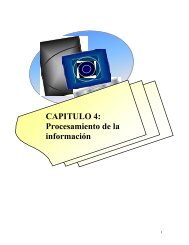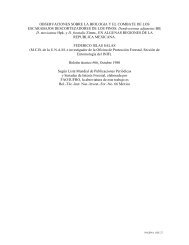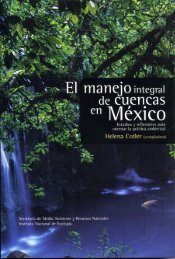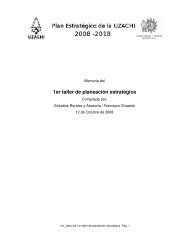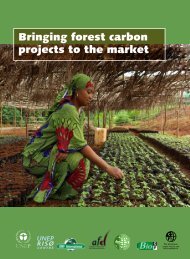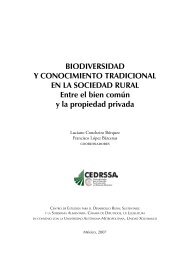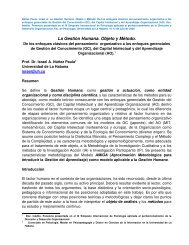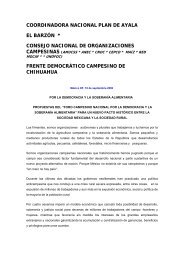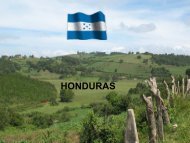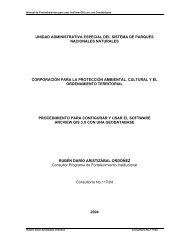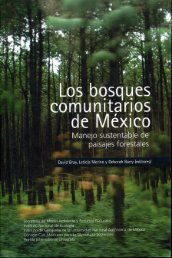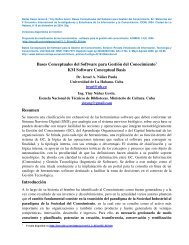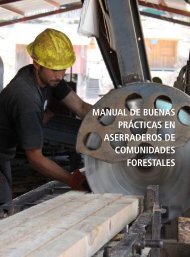STATE OF THE WORLD's INDIGENOUs PEOpLEs - CINU
STATE OF THE WORLD's INDIGENOUs PEOpLEs - CINU
STATE OF THE WORLD's INDIGENOUs PEOpLEs - CINU
- No tags were found...
You also want an ePaper? Increase the reach of your titles
YUMPU automatically turns print PDFs into web optimized ePapers that Google loves.
EMBARGOED UNTIL 14 January 2010<strong>STATE</strong> <strong>OF</strong> <strong>THE</strong> WORLD’S INDIGENOUS PEOPLESNot for distributionDevelopment Bank. Some are working towards adopting guidelines and some include indigenous issues in theirmedium-term plans. One example is the United Nations Development Group (UNDG), which comprises all theUnited Nations system entities dealing with development. In February 2008, it adopted the UNDG Guidelines onIndigenous Peoples’ Issues, 4 a document that will operationalize the UN normative framework on indigenouspeoples, particularly at the level of United Nations country offices. The adoption of these Guidelines is a significantstep in the right direction, and a great deal will depend on their implementation.The UNESCO exampleIt is interesting to examine the work of UNESCO and the General Assembly of States that are party to the UNESCOConventions for the Safeguarding of Intangible Cultural Heritage (2003) and the Protection and Promotion of theDiversity of Cultural Expressions (2005). These Conventions were developed and came into force in the FirstInternational Decade of the World’s Indigenous People and early in the Second Decade respectively. UNESCO didnot include indigenous peoples in the drafting of the Conventions nor was any effort made to engage indigenouspeoples in a meaningful or comprehensive process of consultations before the Conventions came into force.Neither Convention adequately acknowledges the fact that a large part of the “cultural heritage” and “culturalexpressions” referred to in the Conventions are the heritage of indigenous peoples and cultures. Rather, theConventions present these cultural properties as the “heritage of humanity” subject to the rules of internationalcooperation.Indigenous peoples have criticized the UNESCO Conventions because they authorize and legitimize theexpropriation of indigenous cultural property, which is part of their heritage. In her study on the Protection of theHeritage of Indigenous Peoples, 5 Erica Irene Daes, Special Rapporteur of the Sub-Commission on Prevention ofDiscrimination and Protection of Minorities, notes that “heritage is ordinarily a communal right and is associatedwith a family, clan, tribe or other kinship group”. Daes also recognizes that “only the group as a whole canconsent to the sharing of heritage” and that consent is always “temporary and revocable; heritage can never bealienated, surrendered or sold, except for conditional use”. Daes further notes that the individual and collectiverights of indigenous peoples to cultural property are protected under Article 27.2 of the Universal Declaration onHuman Rights, Article 15.1 of the International Covenant on Economic, Social and Cultural Rights and Article 5(d)of the International Convention on the Elimination of All Forms of Racial Discrimination.UNESCO should consider adopting a policy on indigenous peoples that provides for their meaningful participationin UNESCO’s undertakings, in accordance with UNESCO’s Declaration on the Principles of International CulturalCo-operation, which affirms that each culture has a dignity and value that must be protected and preserved andthat “every people has the right and duty to develop its culture”. 6Issues relating to the peaceful resolution of conflictsIndigenous peoples often find themselves involved in conflict with the dominant society, mostly relating to theloss of their lands, territories and resources or to the deprivation of their civil, political, cultural, social andeconomic rights. The rapid pace of globalization has accelerated such conflicts and indigenous peoples, like allother peoples, need access to mechanisms for peaceful conflict resolution.4UNDG (2008).5Daes (1995).6Article 1 of the UNESCO Declaration on the Principles of International Cultural Co-operation (1996).222 | CHAPTER VII



